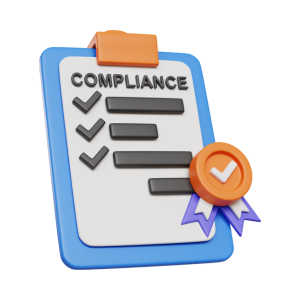FSSAI Registration
FSSAI (Food Safety and Standards Authority of India) registration is a mandatory requirement for food businesses in India. It ensures that your food products meet the safety and quality standards set by the FSSAI, helping to protect consumer health and build trust in your brand.
- Legal Compliance
- Consumer Trust
- Business Credibility

Overview of FSSAI Registration
Food is a basic necessity, and its safety and quality are diligently regulated by the government of India. FSSAI license is mandatory for all food businesses in India. It is not just a statutory requirement but is crucial for the long-term success of the business.
The FSSAI license is issued by the Food Safety and Standards Authority of India, an authority under the Ministry of Health and Family Welfare.
The authority was established with the objective of maintaining scientific standards for food items to regulate their manufacturing, storing, and distribution, including sale and import.
Registering your business with FSSAI has several benefits, such as building trust and credibility with customers, helping to improve the quality of food, giving business access to new markets, and gaining global recognition.
If a person or business operator is found to be manufacturing, storing, distributing, selling or importing any food without an FSSAI certification license, the person or food operator shall be penalized with a fine that may extend up to Rs. 5 lakhs with imprisonment that may extend up to 6 months. FSSAI registration is a simple process that requires simple steps to be followed.
Overview of FSSAI Registration
The Food Safety and Standards Authority of India (FSSAI) issues a license or registration to food businesses, making it mandatory for them to comply with food safety regulations. Whether you are a food manufacturer, retailer, importer, or even a home-based food entrepreneur, obtaining the FSSAI license is a legal requirement. The license is categorized into three types based on the scale of the business:
- Basic Registration: For small businesses with an annual turnover up to ₹12 lakh.
- State License: For medium-sized businesses with a turnover between ₹12 lakh and ₹20 crore.
- Central License: For large businesses, especially those involved in interstate trade, with a turnover exceeding ₹20 crore.
FSSAI registration ensures that food businesses follow essential safety protocols, boosting public confidence in their products.
Benefits of FSSAI Registration
Obtaining an FSSAI license offers several advantages for food businesses:
- Legal Compliance: It ensures that your food business complies with the Food Safety and Standards Act, 2006. Non-compliance can lead to penalties of up to ₹5 lakh and imprisonment.
- Enhanced Brand Image: FSSAI registration builds credibility, showing customers that your business adheres to food safety regulations, which can improve your reputation.
- Market Access: Many large retail chains, supermarkets, and online platforms require suppliers to be FSSAI licensed. This opens doors for wider market access.
- Competitive Edge: An FSSAI license gives your business a competitive advantage by differentiating your brand as reliable and trustworthy, helping you attract more customers.
- Government Support: FSSAI provides resources, training programs, and guidelines to help businesses comply with food safety norms, improving operational standards.
Eligibility Criteria for FSSAI Registration in India
FSSAI registration is mandatory for all food businesses in India, and the level of registration depends upon the scale and nature of the business’s operation. The eligibility criteria for FSSAI Registration or FSSAI license are defined under the Food Safety and Standards Act, 2006 as:
FSSAI Registration type | Eligibility Criteria | Applicable for |
Basic Registration | Businesses that have an annual turnover up to Rs. 12 lakhs. | Small-scale food businesses like home-based producers, food vendors, grocery stores, small caterers. |
State License | Businesses that have an annual turnover ranging from Rs. 12 lakhs to Rs. 20 crores. | Medium-scale businesses, food manufactures, wholesalers, caterers operating in a single state, Hotels, Restaurants, and large food retailers. |
Central License | Businesses that have an annual turnover more than Rs. 20 crores. | Large-scale businesses with national or international operations, importers, exporters, and e-commerce platforms |
Specific License/Approvals | Businesses dealing with specialized products like importers, exporters, processors | Food importers, exporters, and specific processors like meat, dairy, alcohol, etc. |
Required Documents for FSSAI Registration
To register your food business with FSSAI, you’ll need to submit certain key documents, which include:
Identity Proof:
PAN card, Aadhaar card, Passport, or Voter ID of the proprietor/partners/directors.
Business Address Proof:
Utility bills (electricity/water), bank statement, or rent agreement.
Food Category & Business Details:
Information on the type of food products and business activities.
Business Premises Layout:
A detailed layout plan of the business premises showing the operational zones.
Equipment Details:
A list of equipment used in the business, including their specifications.
No Objection Certificate (NOC):
From the business owner, partners, or directors.
Bank Account Details:
Information on the bank account associated with the business.
Additional documents may be required based on the type of business, such as analysis reports of water used in food processing for certain businesses.
Procedure for FSSAI Registration
The FSSAI registration process is simple and can be completed online. Here’s a quick overview:
- Select Your Brand: Choose a unique and distinctive brand that represents your business.
- Classify Your Business: Identify the appropriate food category and class for your products.
- Prepare the Application: Fill in details about the business, the food safety management system, the owner/partners, and the business premises.
- Submit Required Documents: Upload all necessary documents, including identity proof, address proof, and business details.
- Application Submission: Pay the required fees and submit the application for review by FSSAI officials.
- Examination & Approval: The FSSAI will review your application. If everything is in order, your license will be issued.
If necessary, FSSAI officials may request further clarification or documents. Once your application is approved, your business will be registered with FSSAI, legally authorizing you to operate within food safety norms.
FSSAI License Renewal
FSSAI Registration must be updated before its end date to keep legitimacy of the business. The renewal process includes sending a renewed application and paying the necessary fees. The duration of FSSAI Registration is between 1-5 years, based on the type of registration.
For Basic FSSAI Registration, renewing should be done before the end date to avoid delays. State and Central FSSAI Licenses are usually good for the term chosen during the original application.
The renewed application process can be finished online through the FSSAI website and required papers, such as name proof, address proof, a food safety management plan, a list of food products worked with, and proof of previous FSSAI licence, must be provided.
Failure to update the FSSAI Registration before the end date may result in fines and loss of the license.
Get A Free Consultation
FAQ'S
An FSSAI license is a mandatory certification issued by the Food Safety and Standards Authority of India (FSSAI) that authorizes food businesses to operate legally in India. It ensures that the food products meet the safety standards established by the FSSAI and are safe for consumption. The license is a mark of quality assurance and compliance with the Food Safety and Standards Act, 2006, which governs food safety and regulation in India.
An FSSAI license is required for several reasons:
- Legal Compliance: It ensures that the food business complies with the Food Safety and Standards Act, 2006, and related regulations.
- Consumer Trust: It provides consumers with assurance about the safety and quality of food products.
- Market Access: Many retailers, suppliers, and marketplaces require FSSAI certification to do business.
- Health and Safety: It helps in maintaining standards that prevent foodborne illnesses and contamination.
Without an FSSAI license, businesses may face legal penalties, operational restrictions, and loss of consumer trust.
An FSSAI license is required for:
- Food Manufacturers: Companies involved in the production or processing of food products.
- Packagers: Entities that package food products for retail.
- Distributors and Suppliers: Businesses that distribute or supply food products.
- Restaurants and Food Service Providers: Establishments that prepare and serve food.
- Importers and Exporters: Businesses engaged in the import and export of food products.
- The requirement may vary based on the type and scale of the food business.
The FSSAI issues three types of licenses based on the scale and scope of the food business:
- FSSAI Basic Registration: For small businesses with an annual turnover of up to ₹12 lakh. Suitable for small-scale operators such as local food vendors or small manufacturers.
- FSSAI State License: For medium-sized businesses with an annual turnover between ₹12 lakh and ₹20 crore. Applicable to larger food manufacturers, processors, and establishments.
FSSAI Central License: For large businesses with an annual turnover exceeding ₹20 crore or those involved in import/export. This license is also required for food businesses operating across multiple states or with a complex supply chain.
The documents required for FSSAI license registration depend on the type of license being applied for but generally include:
- Business Registration Documents: Certificate of incorporation, partnership deed, or sole proprietorship registration.
- Proof of Address: Utility bills, lease agreements, or property documents showing the address of the business.
- PAN Card: Permanent Account Number (PAN) of the business or owner.
- Food Safety Management System (FSMS) Plan: For certain types of businesses, a detailed plan outlining food safety practices may be required.
- Blueprint/Layout Plan: For manufacturing units, a blueprint of the production facility.
- List of Directors/Partners: Identification and details of the company’s directors or partners.
- Declaration Form: Self-declaration about the adherence to food safety standards and practices.
The process for obtaining an FSSAI license involves:
- Determine the License Type: Identify whether you need a Basic Registration, State License, or Central License based on your business size and activities.
- Prepare Documents: Gather and prepare the necessary documents and information required for the application.
- Submit Application: File the application online through the FSSAI’s Food Licensing and Registration System (FLRS) or offline with the local FSSAI office.
- Verification: The FSSAI authority will review the application and documents. They may conduct a site visit or request additional information.
- Receive License: Upon successful verification, the FSSAI will issue the license, which must be prominently displayed at the place of business.
The time required to obtain an FSSAI license can vary based on:
- Type of License: Basic Registration is usually processed faster compared to State or Central Licenses.
- Completeness of Application: A complete and accurate application can speed up the process.
- Processing Load: The current workload and efficiency of the FSSAI office handling the application.
Typically, the process can take from a few weeks to a couple of months. Applicants can track the status of their application through the FSSAI’s online portal.
The fees for FSSAI license registration vary based on:
- License Type: Basic Registration, State License, and Central License have different fee structures.
- Business Size: Fees may vary depending on the scale and nature of the business.
Fees generally cover the processing of the application and the issuance of the license. The exact fees can be checked on the FSSAI website or by contacting the local FSSAI office.
Responsibilities of a license holder include:
- Compliance with Regulations: Adhere to the Food Safety and Standards Act, 2006, and related regulations.
- Maintaining Records: Keep accurate records of food safety practices, ingredients, and production processes.
- Renewal of License: Renew the license before its expiry to avoid lapses in certification.
- Displaying the License: Ensure the FSSAI license is prominently displayed at the place of business.
- Quality Assurance: Implement and follow practices that ensure the safety and quality of food products.
Failure to obtain or renew an FSSAI license can result in:
- Legal Penalties: Fines or legal action for operating without a valid license.
- Operational Restrictions: Suspension of business operations until compliance is achieved.
- Reputational Damage: Loss of consumer trust and potential business opportunities.
- Product Recall: If food products are found to be non-compliant, they may be recalled, leading to financial losses and legal issues.
It is crucial to ensure that your FSSAI license is obtained and renewed timely to avoid these consequences.








